If you’ve had the opportunity to partake in a fishing tournament or competition, then you’re well-acquainted with the adrenaline rush and tenacity it demands. As someone who has navigated those very waters of anticipation and sheer exhilaration, I understand how pivotal rules set by Idaho Fish and Game can be when seeking that balance between safeguarding fish populations while managing overcrowding.
In this article, we’ll explore 21 valuable tips guaranteed to help master these heart-pounding competitions — from unraveling different types of tournaments to polishing your casting techniques, all the way down to handling pressure on the big day.
Are you ready for that victorious catch?
Key Takeaways
- Fishing tournaments come in different types, such as bass fishing, fly fishing, and saltwater fishing events.
- Each tournament has its own rules and regulations that you need to know before participating. Scoring systems also vary from one tournament to another.
- Having the right gear and equipment, like fishing rods and reels, strong lines and hooks, bait and lures, and fishing accessories is crucial for success in tournaments.
- Mastering different fishing techniques such as casting and retrieving, jigging, trolling, drift fishing, and fly fishing can greatly improve your chances of winning.
Understanding the Basics of Fishing Tournaments and Competitions
Different types of fishing tournaments include freshwater, saltwater, bass fishing, fly fishing, and ice fishing competitions with varying rules and regulations governing each type.
Different types of fishing tournaments
Fishing tournaments come in many forms. Bass fishing contests are common, drawing both new and old fishers. Angling competitions are also popular and can be very fun. There are even trout tournaments for those who love to catch this type of fish. Saltwater fishing events take place in the ocean, while carp fishing matches focus on a specific type of freshwater fish.
Rules and regulations
Rules keep fishing tournaments fair and fun. Every tournament has its own rules. You should know these rules before you start to fish. For example, BASS tournaments have a certain set of guidelines.
You can get all the information about these rules from the BASS group. In a Kayak Bass Fishing match, there’s someone in charge called the Tournament Director or the Director of Operations who makes sure everyone follows the rules.
The Crusader Classic Fishing Tournament even sets out when you can fish – that’s between 6:30 in the morning until 2:30 in the afternoon! If you choose to take part in an Atlantic HMS tournament, you need to stick by their rule book too.
This includes things like having a permit and following size limits for what you catch! There are lots of places where you can find answers if you have questions about fishing contests such as how they’re organized or how to locate them.
Scoring and ranking systems
Scoring and ranking systems play a crucial role in fishing tournaments and competitions. They provide a fair and straightforward way to determine the winners. However, not all tournaments follow the same scoring system. Let’s dive into some of the most common scoring and ranking methods used in fishing tournaments.
| Scoring System | Description |
|---|---|
| Ranking 10 Pros | In this method, 10 pros are ranked from 1 through 10 before each tournament. This is the common scoring system used by many fishing tournaments. |
| Paper Tournament | A “paper tournament” awards points based on the length of the fish caught. There is a minimum length requirement for a fish to count towards the total. |
| Points System | Many saltwater tournaments use a points system. However, these may need to be changed to ensure fairness in the competition. |
| Weight-Based Scoring | An alternate scoring suggestion is to use the weight of the fish caught instead of points. Using this system can help to avoid any unfair ties that might occur with the current scoring systems. |
| Penalty System | In Major League Fishing (MLF), there is a 15-minute penalty rule for certain violations during tournaments. Violations can include fishing in off-limits areas, late return to the check-in point, or not following catch and release rules. |
Remember, each tournament will have its own set of rules and scoring systems. Always check the specifics before participating in any fishing competition.
Essential Fishing Gear and Equipment
In fishing tournaments and competitions, having the right gear and equipment is essential for success. Fishing rods and reels should be chosen based on the target fish species and fishing technique.
Strong fishing lines and sharp hooks are crucial for secure hooksets. Bait and lures play a significant role in attracting fish, so it’s important to have a variety of options to match different conditions.
Additionally, using fishing accessories like tackle boxes, line cutters, and nets can make your angling experience more convenient and efficient.
Fishing rods and reels
When it comes to fishing, having the right gear is essential. Fishing rods and reels are key components of your equipment. Different types of fishing require different styles of rods and reels, so it’s important to choose wisely.
Cheaper materials may make the rod heavier and less durable, so investing in a quality rod is worth it. Specific rods and reels are designed for different fishing styles like bass fishing or fly fishing.
Remember, weights are necessary for casting distance and bait control. Each element – the rod, reel, line, and tackle – plays an important role in successful fishing.
Fishing lines and hooks
Fishing lines and hooks are essential gear for any fishing tournament or competition. They play a crucial role in helping you catch fish. The right type of line and hook can improve your chances of success.
Different types of lines, such as monofilament and braided lines, have different strengths and characteristics that can affect the way you fish. Hooks come in various sizes and shapes to accommodate different types of bait and target fish species.
It’s important to choose the right combination of line and hook based on the fishing conditions and the type of fish you’re targeting. So make sure to have a variety of lines and hooks in your tackle box to be prepared for any situation during a tournament or competition.
Bait and lures
In fishing tournaments and competitions, having the right bait and lures is essential. When using soft plastic baits, it’s important to have hooks, weights, and swivels to create different rigs.
Artificial lures are also great options as they mimic fish, insects, and other aquatic organisms. These lures can be used to attract various types of fish in the tournament. To enhance your fishing experience further, consider including the top 10 bass lures of all time in your tackle box.
Having a variety of bait and lures will increase your chances of success in catching fish during the competition.
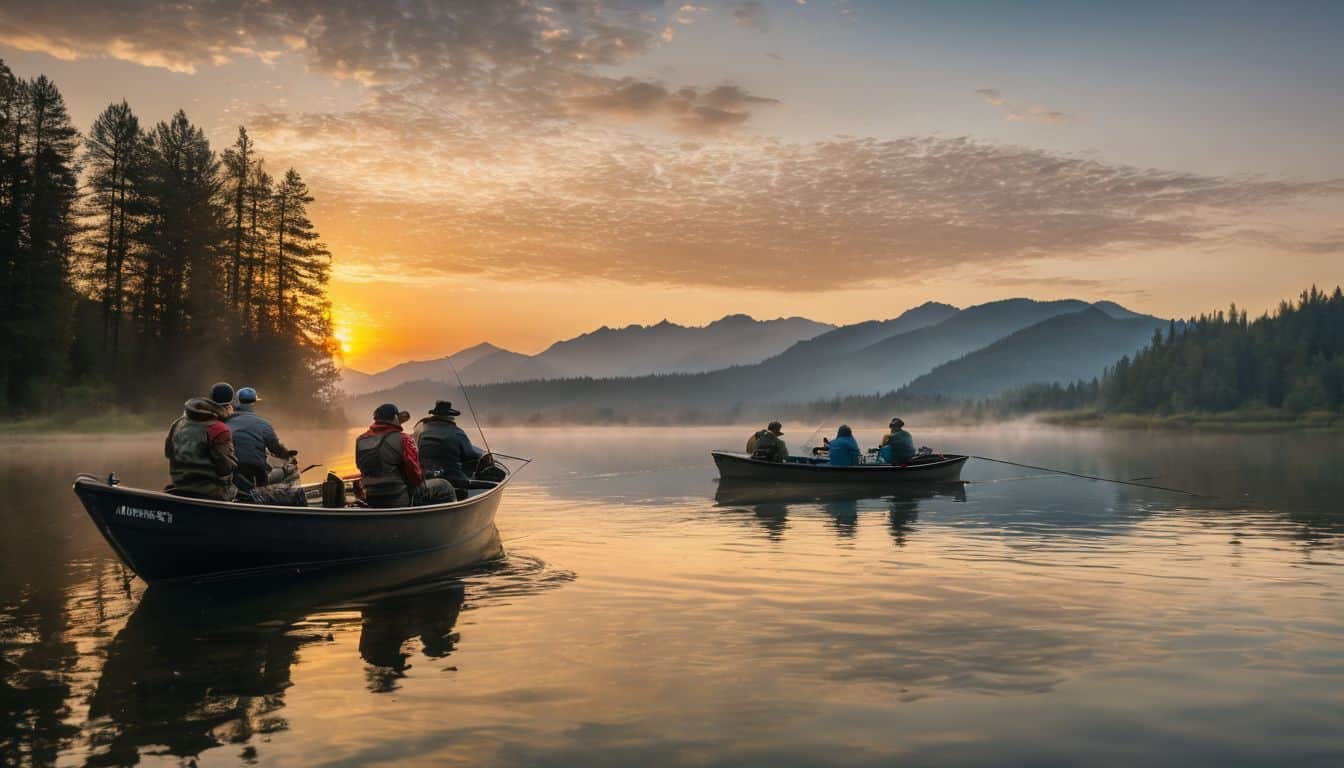
Fishing accessories
One of the most important fishing accessories to have in a tournament is a good pair of pliers. They are easy to forget, but essential for various tasks like removing hooks and cutting line.
Having a durable and reliable pair of pliers can save you time and frustration during competition. Another useful fishing accessory is the Catch Hook Keeper, which allows you to secure your hooks safely while moving between spots.
Additionally, having an in-deck tool garage can keep all your fishing tools organized and easily accessible on your boat. And don’t forget about rod sox! These protective covers help prevent damage to your rods during transportation.
Mastering Different Fishing Techniques
In this section, we will explore various fishing techniques such as casting and retrieving, jigging, trolling, drift fishing and fly fishing.
Casting and retrieving
Casting and retrieving techniques are really important when it comes to fishing tournaments and competitions. They can make a big difference in how successful you are at catching fish.
Proper casting techniques help you present your lure in the best way possible, making it more appealing to the fish. And when you’re retrieving your lure, pay close attention! By watching how your lure moves through the water, you might be able to tell if a fish is biting or if there’s any movement nearby.
So practicing good casting and retrieving skills can definitely improve your chances of winning those tournaments!
Jigging
Jigging is a popular fishing technique that I have mastered for tournaments and competitions. It involves using jigs, which are made up of a lead sinker with a hook. When you jig, you create a jerky, vertical motion in the water to attract fish.
This technique can be really effective for targeting certain types of fish like tuna and yellowtail, especially when using live bait. Another jigging method that works well is bucktail jigging, which is great for catching stripers in the midwater column and along the bottom.
Mastering different jigging techniques has definitely helped me improve my success in fishing tournaments!
Trolling
Trolling is an awesome fishing technique that can help you catch a lot of fish. It’s all about dragging your bait or lure through the water behind a moving boat. This method is super effective, especially when you’re trying to catch big fish in fishing tournaments and competitions.
You can use live bait or artificial lures for trolling, depending on what works best for you. So get on your boat, let out your line, and start trolling to reel in some amazing catches!
Drift fishing
Drift fishing is a technique that can help me keep my fishing lines straight and prevent them from getting tangled. It’s especially useful when I’m targeting catfish in the winter.
Another technique called suspended drifting can also be effective for catching catfish. Drift fishing is an important skill to master, especially if I want to excel in fishing tournaments and competitions.
It’s all about using different techniques and strategies to increase my chances of success on the water.
Fly fishing
Fly fishing is an ancient form of angling that has been around for centuries. It involves using a special type of fishing rod and casting a lightweight artificial fly to catch fish.
In fly fishing, the fly imitates insects or other small creatures that fish like to eat. There are different types of flies used in fly fishing, such as dry flies, wet flies, nymphs, streamers, bucktails, and terrestrials.
When participating in competitive fly fishing tournaments or competitions, the goal is to catch the maximum number of fish within a given time frame. It requires skill and technique to successfully cast the fly and entice the fish to bite.
Preparing for Fishing Tournaments and Competitions
Before participating in fishing tournaments and competitions, it is crucial to research the fishing location, check weather and water conditions, create a fishing plan, and organize tackle and equipment.
Researching the fishing location
Before heading out to a fishing tournament or competition, it’s important to do some research about the fishing location. This helps you understand the area better and increases your chances of success.
Start by gathering information about the fishing locations in that area, including where the best spots are for different types of fish. Find out when is the best time of year to fish there, as well as what the water temperature and wind conditions are like.
It’s also helpful to know what type of bait works best in that area. Gathering these details will give you a strategic advantage and make your fishing experience more enjoyable.
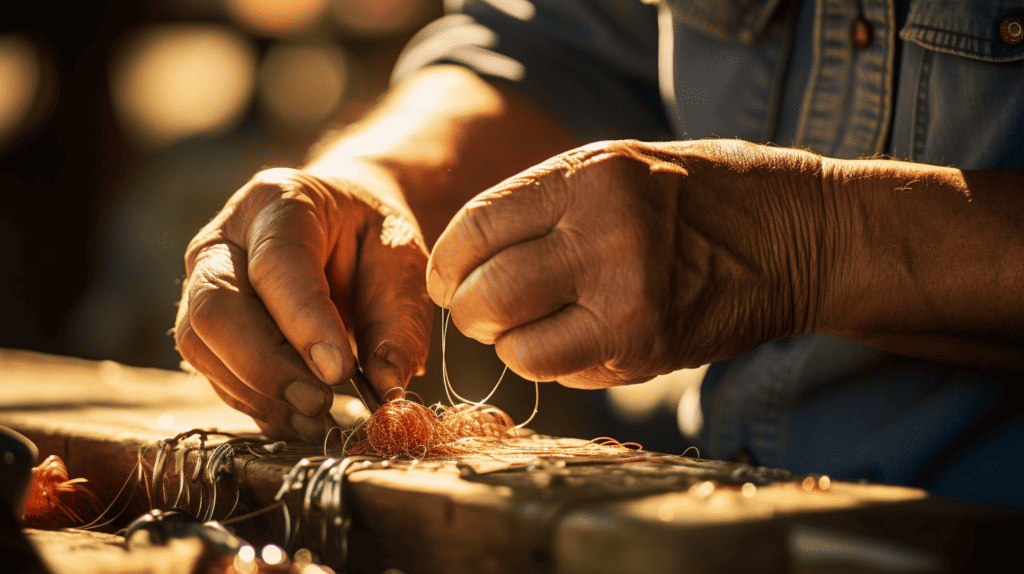
Checking weather and water conditions
Before participating in fishing tournaments and competitions, it’s crucial to check the weather and water conditions. This is an important step that anglers often do during the pre-practice stage.
By visiting the tournament location and scouting potential fishing areas, you can get a sense of what to expect on competition day. You’ll want to know if there are any upcoming storms or strong winds that may affect your fishing experience.
Additionally, understanding the water conditions such as temperature, clarity, and current will help you choose the right techniques and gear for success. Remember to stay updated on weather forecasts and monitor changes in water conditions leading up to the tournament for optimal preparation.
Creating a fishing plan
To have success in fishing tournaments and competitions, it’s important to create a fishing plan. Here are some key tips to help you:
- Conduct historical research on the tournament location.
- Study maps and charts to identify productive fishing areas.
- Consider the time of year and seasonal patterns for the target fish species.
- Take note of any specific rules or regulations for the tournament.
- Determine the best techniques and bait to use based on local knowledge and past tournament results.
- Develop a strategy for different weather conditions, such as windy or sunny days.
- Plan your schedule for practice sessions before the tournament to scout out potential spots.
- Make sure you have all the necessary equipment and supplies ready.
Organizing tackle and equipment
Having an organized tackle box is essential for maximizing your time and efficiency during fishing tournaments. Here are some tips to help you organize your tackle and equipment:
- Pack necessities first: Make sure you have all the essential items, such as fishing line, hooks, weights, and pliers, packed in your tackle box before anything else.
- Use tackle storage solutions: Invest in tackle boxes or organizers with compartments to keep your gear neat and easily accessible. This will save you time and frustration when searching for specific items.
- Label tackle items: Use labels or markers to identify different types of lures, hooks, or bait in your tackle box. This will make it easier to find what you need quickly.
- Sort by category: Group similar items together in your tackle box. For example, keep all your soft plastic baits in one section and hard baits in another. This organization will help you locate specific items faster.
- Keep terminal tackle organized: Use small containers or zip-lock bags to store hooks, swivels, and other small terminal tackle items separately within your tackle box.
- Efficiently store baits: Consider using hard boxes for organizing larger baits and combining soft plastics into larger containers to save space.
- Maintain a clean and tidy tackle box: Regularly check and clean out any old or damaged items from your tackle box to ensure everything is in good working order.
Strategies for Success in Fishing Tournaments and Competitions
To achieve success in fishing tournaments and competitions, it’s crucial to identify your target fish species, choose the right bait and technique, fish in productive areas, and time your efforts effectively.
With these strategies, you’ll increase your chances of winning big!
Identifying target fish species
To be successful in fishing tournaments and competitions, it’s important to identify the target fish species you’ll be going after. Knowing the specific types of fish you’re trying to catch will help you plan your fishing strategies and choose the right bait and techniques.
For example, if you’re targeting bass, understanding their behavior and habitat preferences can give you an advantage. Similarly, if you’re fishing in saltwater areas like Virginia, knowing the game fish species found in those waters, such as flounder or red drum, can help guide your approach.
So take some time to research and familiarize yourself with the target fish species for a better chance at winning that tournament!
Choosing the right bait and technique
Choosing the right bait and technique is really important when you’re fishing in tournaments or competitions. It can make a big difference in your chances of catching fish and winning prizes.
One option is to use Berkley hard or soft bait, which can qualify you for cash prizes through the Cast for Cash program. If there aren’t any specific patterns to follow, you can try a strategy called “junk fishing,” where you use different types of bait to see what works best.
Look for secondary or overlooked primary patterns that other anglers might have missed. The key is to be flexible and try different baits until you find something that attracts the fish.
In fishing tournaments and competitions, choosing the right bait and technique can greatly increase your chances of success. Using Berkley hard or soft bait in sanctioned events will make you eligible for cash prizes through the Cast for Cash program – an exciting opportunity! When specific fishing patterns aren’t available, many anglers turn to “junk fishing,” using multiple baits as part of a broader strategy.
Fishing in productive areas
To increase your chances of success in fishing tournaments and competitions, it’s important to fish in productive areas. By selecting multiple areas known for their productivity, you can improve your odds of catching fish.
Pay attention to the water environment, including its structure, depths, and the behavior of the fish you are targeting. Understanding these factors will help you locate spots where fish are likely to gather.
Being open to changing your fishing techniques and strategies based on conditions will also improve your tournament results. Remember to adapt to the capabilities of your boat and make the most out of what you have.
Timing your fishing efforts
Timing your fishing efforts is crucial when it comes to fishing tournaments and competitions. It’s not just about getting out on the water and hoping for the best. You need to carefully plan your fishing strategy by considering factors like weather conditions, water temperature, and the behavior of the fish you’re targeting.
By selecting multiple productive areas to fish in and utilizing different profiles, such as targeting different parts of the water column, you can increase your chances of success.
Remember that catching a lot of fish during practice doesn’t guarantee great tournament finishes – it’s all about adapting your techniques based on real-time conditions and making smart decisions on when and where to cast your line.
Tips for Catching Big Fish
Target trophy fish by using larger baits and lures, exercising patience and persistence, and practicing proper fish handling.
Targeting trophy fish
When targeting trophy fish in fishing tournaments and competitions, there are a few key tips to keep in mind. First, using larger baits and lures can attract bigger fish as they tend to go after larger prey.
Secondly, patience and persistence are crucial because catching big fish may take longer than expected. It’s important to stay focused and not get discouraged. Finally, proper fish handling is essential when targeting trophy fish.
Using hooks made of high-carbon hardened steel is recommended as they are less likely to break when reeling in a large catch.
Using larger baits and lures
Using larger baits and lures can greatly improve your chances of catching big fish in fishing tournaments and competitions. By using a bigger hook, you increase the likelihood of hooking a larger fish.
Additionally, adding more scent to your lures can attract big fish as they rely heavily on their powerful sense of smell to find food. Remember that presenting your bait in the most realistic manner possible will give you the best chance at landing a trophy-sized fish.
So don’t be afraid to go big when it comes to bait size and lure selection!
Patience and persistence
To become a master at fishing tournaments and competitions, patience and persistence are key. Catching a big fish takes time and perseverance. It’s not something that happens instantly or with just one try.
You have to be dedicated and committed to the process of fishing. Through consistency and tenacity, you increase your chances of success. Fishing requires endurance, both physically and mentally.
It can sometimes be challenging, but with determination and resilience, you can overcome any obstacles that come your way. Patience is also crucial in fishing as it supports your persistence by allowing you to wait for the right moment to strike.
Proper fish handling
Proper fish handling is really important when it comes to fishing tournaments and competitions. As anglers, our goal should be to minimize stress and harm to the fish. When you catch a fish, try to lift it carefully and place it in a net or on a measuring board so you can measure its size without causing too much stress.
After you’ve measured the fish, make sure to release it back into the water as quickly as possible. It’s best to avoid excessive handling of the fish and never hold it by its gills or squeeze it tightly.
By taking care of the fish during tournaments, we contribute to their welfare and promote sustainable fishing practices.
Sportsmanship and Ethics in Fishing Tournaments and Competitions
Respect fishing regulations and catch limits, practice catch and release, show courtesy to other anglers, and follow tournament rules and guidelines.
Respecting fishing regulations and catch limits
Respecting fishing regulations and catch limits is a crucial part of being a responsible angler in fishing tournaments and competitions. It shows good sportsmanship and ethical behavior towards the fish population and the environment.
By following these rules, we can ensure that our fishing activities are sustainable for future generations to enjoy.
In most recreational fishing tournaments, there is a catch-and-release rule in place. This means that once you catch a fish, you must carefully release it back into the water unharmed.
This helps to preserve fish stocks and maintain healthy populations.
Additionally, it’s important to understand that when participating in a fishing tournament, you must only fish within the designated tournament waters. These boundaries are set by the tournament director and should be strictly followed to ensure fair competition among all anglers.
Practicing catch and release
When participating in fishing tournaments and competitions, it is important to practice catch and release. This means that after catching a fish, you release it back into the water instead of keeping it.
Catch and release fishing is considered a practice of sportsmanship and ethics. It helps to conserve fish populations, maintain sustainability, and preserve our natural resources. By releasing the fish, we are giving them a chance to grow bigger and reproduce, ensuring healthy fishery management for the future.
It also promotes environmental stewardship and responsible angling practices. So remember, when participating in fishing tournaments or competitions, always practice catch and release for the sake of conservation and fair play.
Showing courtesy to other anglers
It’s important to show courtesy to other anglers when participating in fishing tournaments and competitions. This means respecting their space and not encroaching on their fishing spot.
It also means being mindful of noise levels and avoiding disruptions that could affect their fishing experience. By showing consideration for others, we can create a positive and respectful atmosphere on the water.
Let’s remember that fishing is meant to be enjoyable for everyone involved, so let’s practice good sportsmanship and treat our fellow anglers with respect.
Following tournament rules and guidelines
In fishing tournaments and competitions, it is crucial to follow the rules and guidelines set by the organizers. This shows good sportsmanship and ethical behavior towards both your teammates and opponents.
It also ensures fair play and maintains a level playing field for everyone involved. By adhering to these regulations, you demonstrate respect for your competitors and the sport itself.
To know exactly what rules to follow, consult the specific regulations provided in the tournament book or guidelines given by organizers like Gulf Coast Masters (GCM) competitions.
Mental and Physical Preparation for Fishing Tournaments and Competitions
Maintaining focus and concentration, managing stress and pressure, and staying physically fit are crucial for excelling in fishing tournaments. Find out how to prepare yourself both mentally and physically for the ultimate angling challenge.
Maintaining focus and concentration
Being mentally prepared is crucial for success in fishing tournaments and competitions. It’s important to stay focused and avoid overthinking strategies. Having a positive mental outlook on life can help maintain focus and overcome frustration during the tournament.
Remember, maintaining concentration throughout the competition is key to winning, as it can make all the difference between success and failure. So, take some time to practice focus and concentration techniques before the tournament begins.
Stay calm, trust your skills, and keep your eye on that trophy fish!
Managing stress and pressure
Managing stress and pressure is essential when participating in fishing tournaments and competitions. As an angler, I understand the importance of keeping calm and focused to perform at my best.
Coping with stress requires mental preparation and resilience. I rely on techniques like deep breathing, visualization, and positive self-talk to stay composed under pressure. It’s also crucial to take care of my physical well-being by staying fit through regular exercise.
By managing stress effectively, I can maintain a clear mind, make better decisions, and improve my overall performance on the water.
Staying physically fit
Being physically fit plays a vital role in preparing for fishing tournaments and competitions. When I stay physically fit, it helps me be mentally prepared for the challenges ahead.
Regular exercise improves my mental health and overall well-being, allowing me to maintain focus and concentration during fishing events. Additionally, physical activity promotes growth and development while providing multiple benefits for both my physical and mental health.
It’s important to remember that staying physically fit doesn’t have to be complicated or time-consuming. By meeting the recommended guidelines of at least 60 minutes of moderate to vigorous intensity physical activity each day, I can enhance my cognitive readiness for fishing competitions.
Whether it’s going for a run, swimming laps, or even taking brisk walks around my neighborhood, any form of exercise contributes positively to my mental preparedness.
Conclusion on Fishing Tournaments And Competitions
In conclusion, mastering fishing tournaments and competitions requires a combination of knowledge, skill, and preparation. By understanding the basics, having the right gear and equipment, using effective techniques, and strategizing for success, you can greatly increase your chances of coming out on top.
Remember to always fish ethically and practice good sportsmanship. With dedication and practice, you can become a true champion in the exciting world of fishing tournaments.
FAQs on Fishing Tournaments And Competitions
1. How can I improve my chances of winning a fishing tournament?
To improve your chances of winning a fishing tournament, focus on scouting the area beforehand, choosing the right bait and lures for the target fish, and practicing different fishing techniques to adapt to changing conditions.
2. What should I bring with me to a fishing competition?
When participating in a fishing competition, it’s important to bring essential items such as fishing rods and reels, tackle boxes with various lures and baits, appropriate clothing for weather conditions, sunscreen, snacks or meals for energy, drinking water or hydration fluids.
3. How do I know which type of bait or lure to use during a fishing tournament?
Choosing the right bait or lure during a fishing tournament requires understanding the target fish species’ feeding habits and preferences. Researching local waters and talking with experienced anglers can provide valuable insights on what works best.
4. Is it necessary to have expensive equipment for competitive fishing?
While having top-of-the-line equipment may be advantageous in some cases, expensive gear is not always necessary for competitive fishing success. It’s more important to have knowledge about fish behavior patterns and proper technique execution.
5. Are there any specific rules or regulations I need to follow during a fishing tournament?
Yes, most fishing tournaments have specific rules and regulations that participants must adhere to regarding things like catch limits, size restrictions, live well usage (if applicable), sportsmanship conduct towards other anglers while on the water etc.

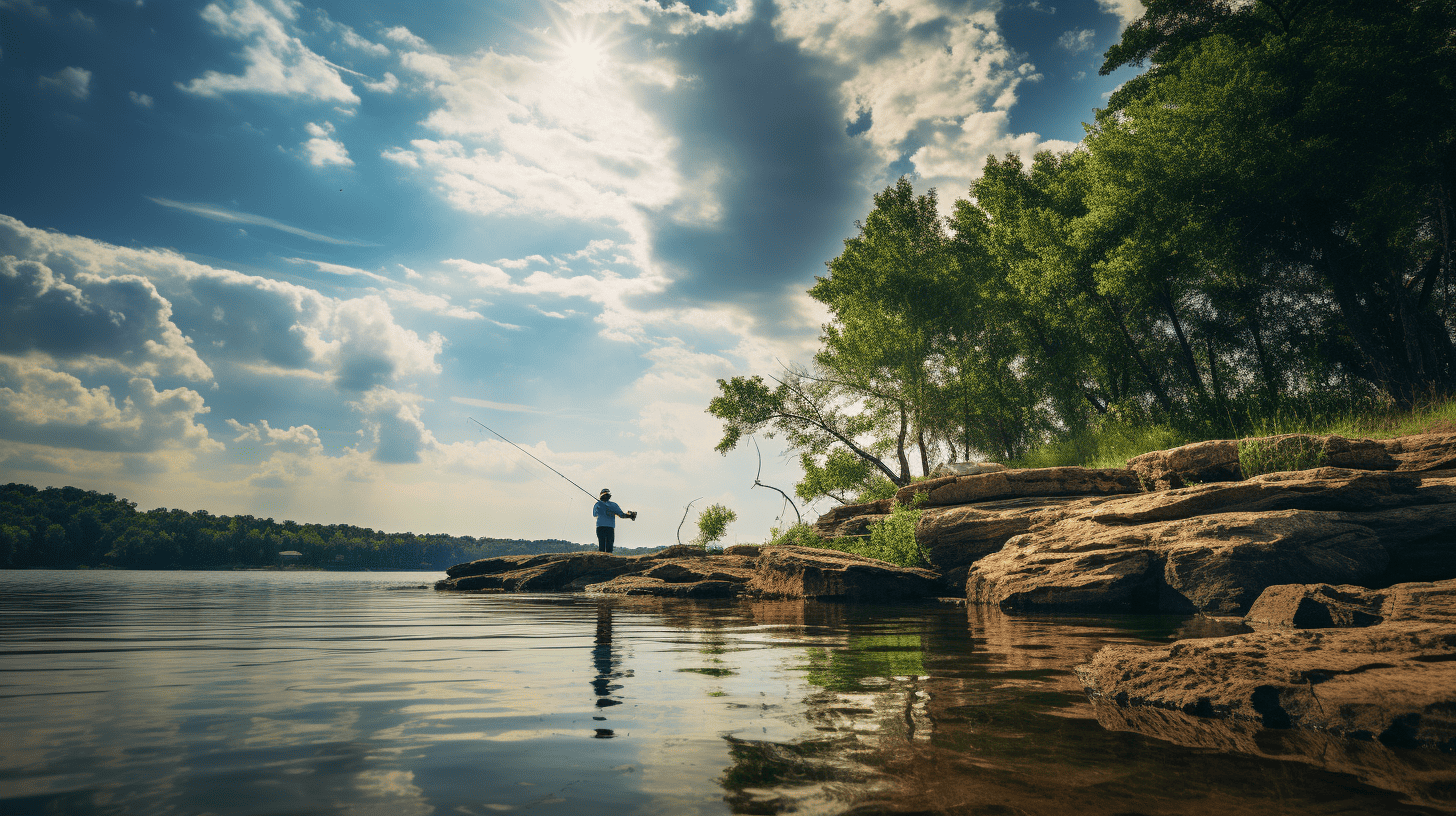
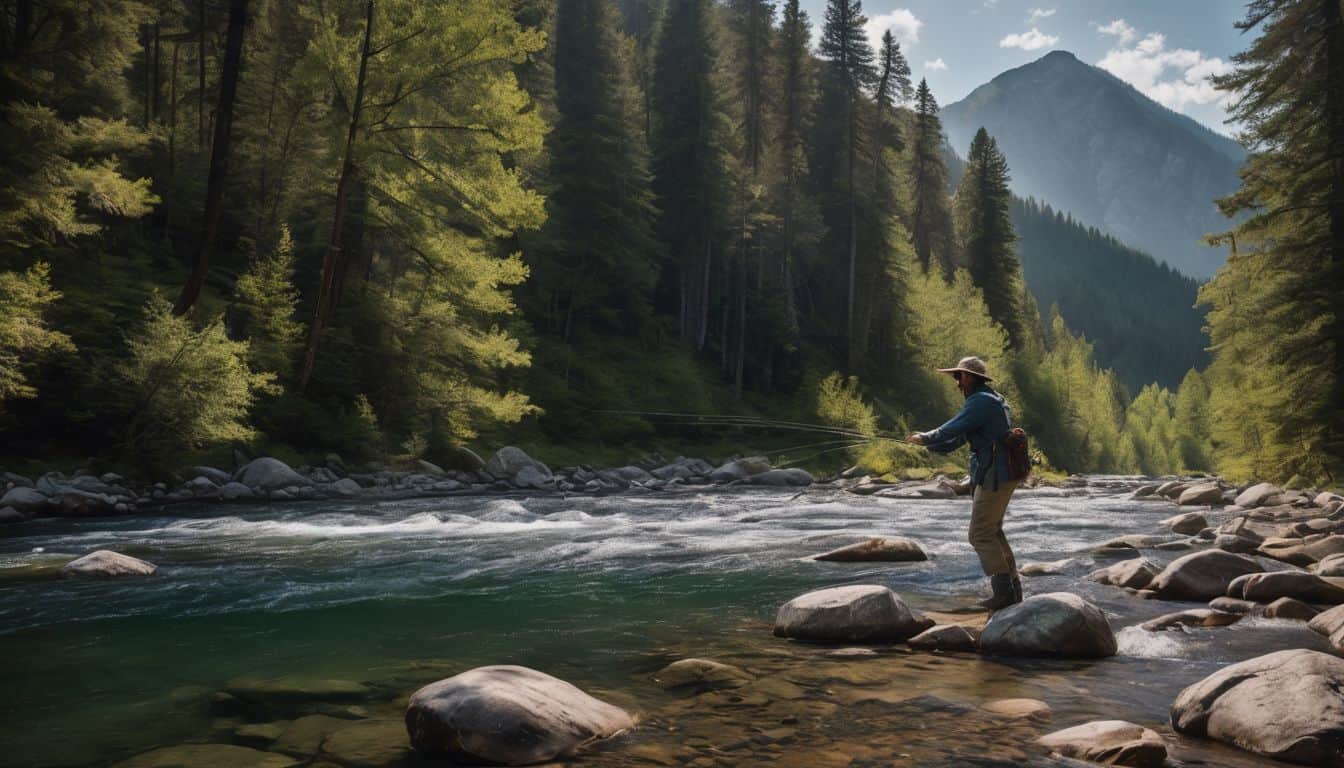
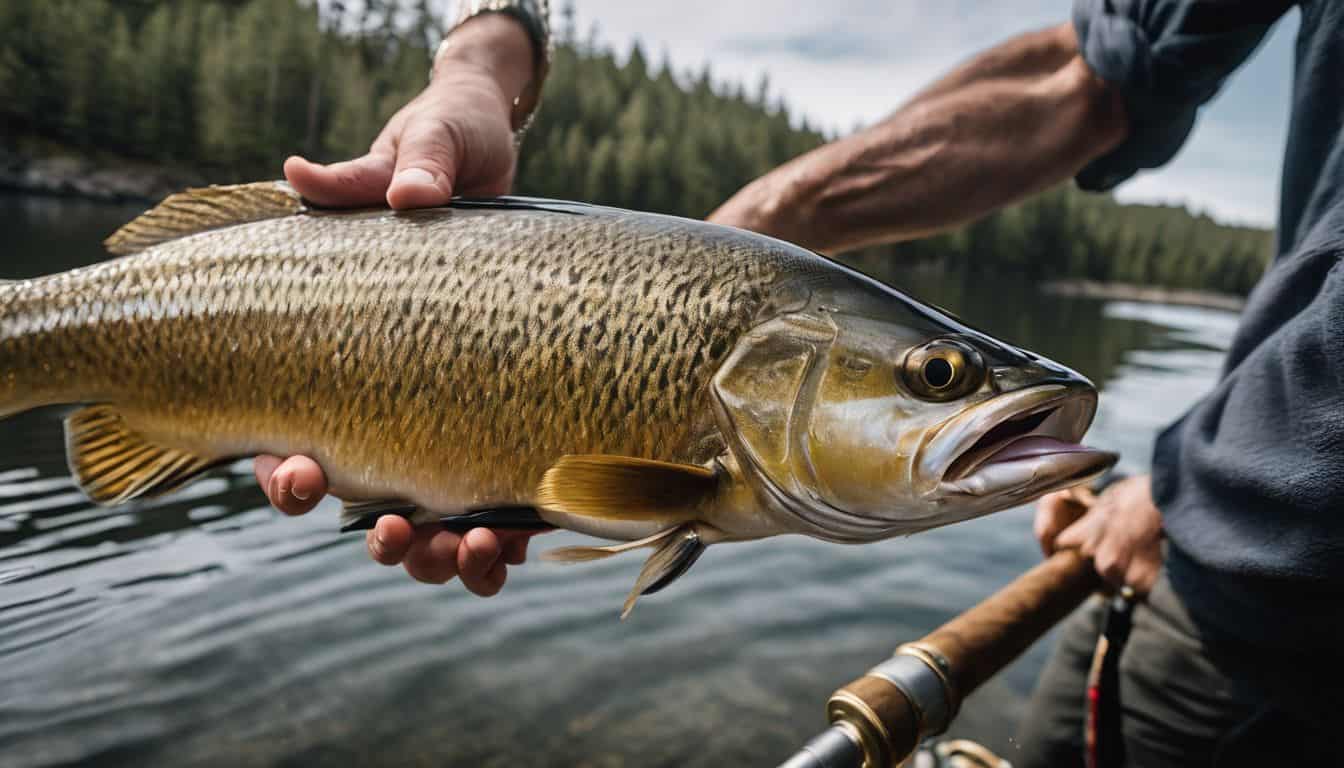
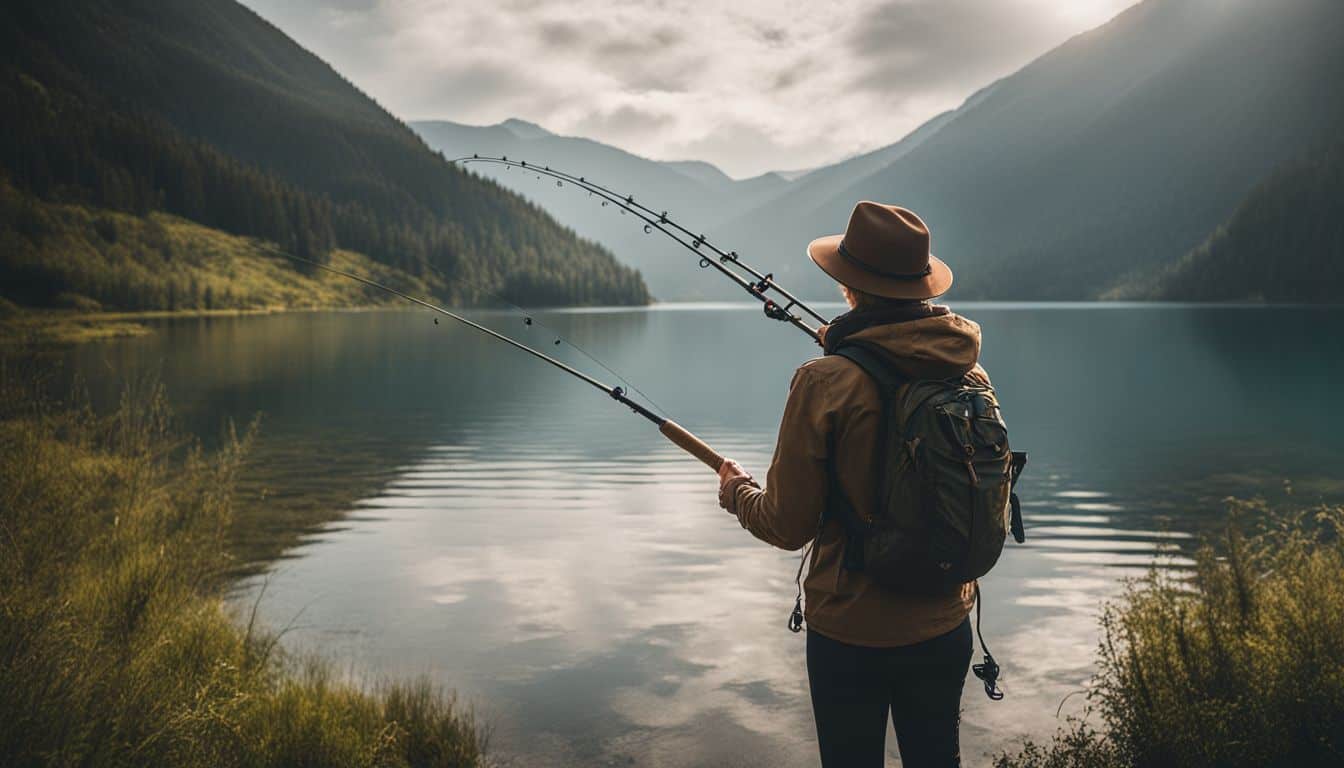
Leave a Reply